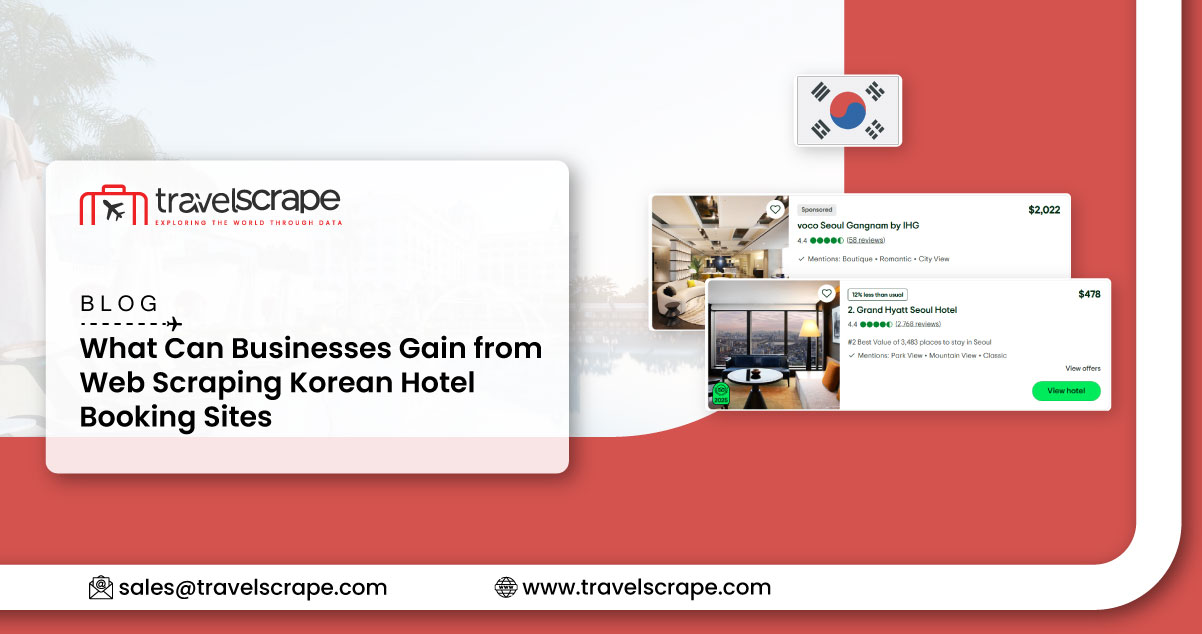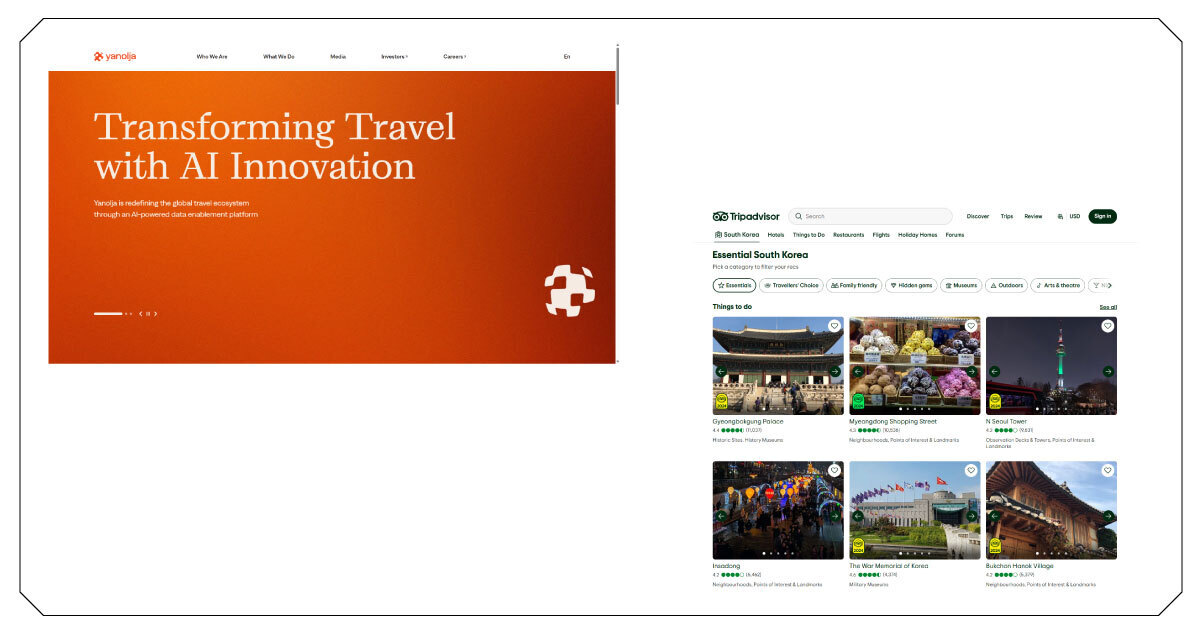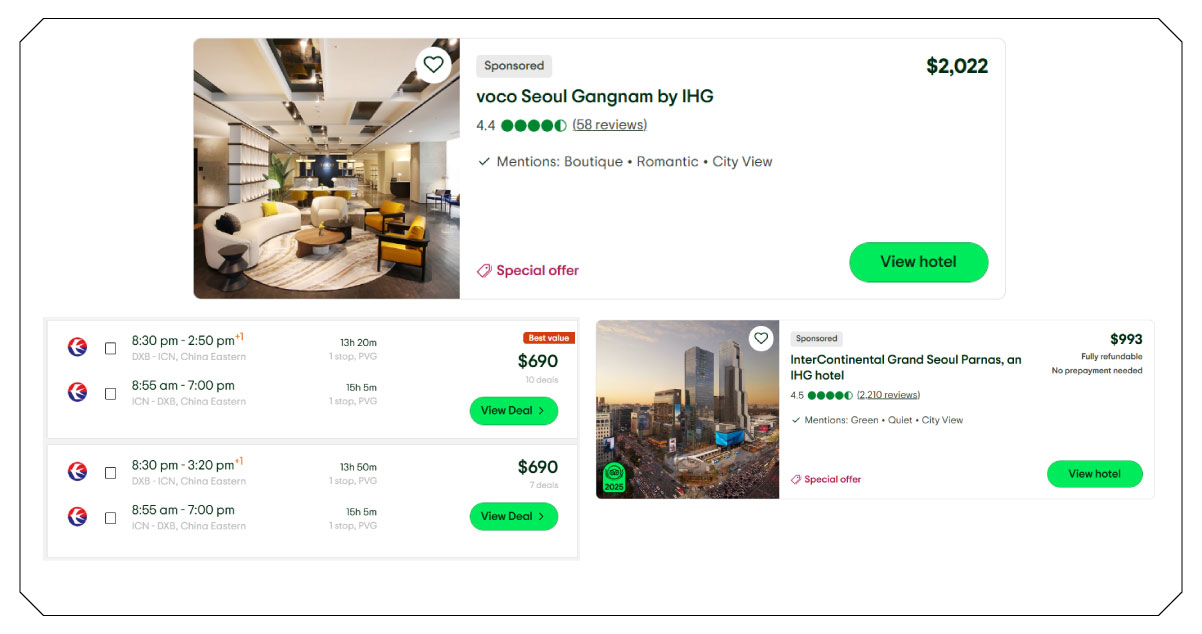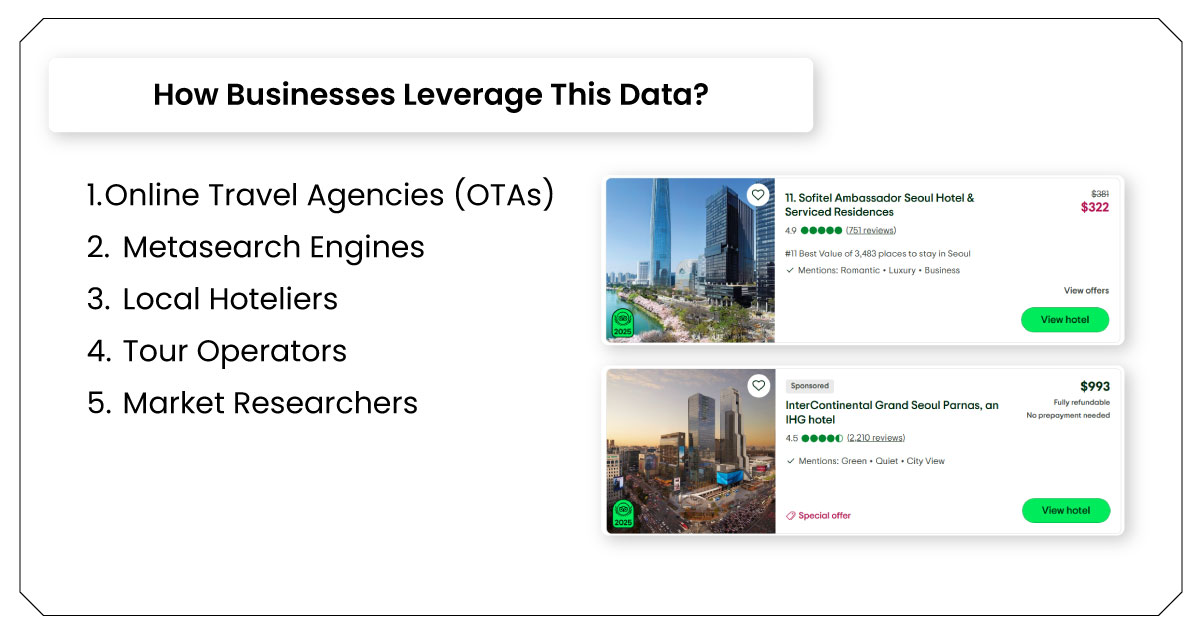What Can Businesses Gain from Web Scraping Korean Hotel Booking Sites?

Introduction
Over the last decade, the travel industry has seen a dramatic shift, powered by the rise of data analytics, demand-driven pricing, and highly personalized digital experiences. South Korea has emerged as a leading destination in this transformation, attracting millions of travelers with its vibrant culture, scenic spots, and tech-savvy hospitality sector. To stay competitive in such a dynamic market, travel businesses now depend on accurate, real-time information sourced directly from local hotel booking platforms. This growing need has fueled the adoption of Web Scraping Korean Hotel Booking Sites, enabling companies to capture, structure, and analyze vast datasets for smarter decision-making.
Whether it's adjusting room rates, managing seasonal demand, or creating custom packages, web scraping helps companies uncover actionable insights that would otherwise remain hidden. One of the most impactful uses is to Compare Hotel Rates in Korea using Web Scraping, giving businesses and travelers access to transparent and dynamic pricing. From OTAs and hotel chains to data platforms and travel planners, stakeholders across the industry utilize scraping technology to stay ahead of market trends and enhance their service offerings in South Korea's rapidly evolving travel landscape.
About Yanolja and GoodChoice

Two dominant names dominate Korea's online hospitality booking industry—Yanolja and GoodChoice (Yeogi Eottae). These platforms offer a wide array of listings, including hotels, motels, guesthouses, pensions, and even camping facilities. Yanolja, often referred to as the "Booking.com of Korea," has evolved into a global travel tech company, offering SaaS solutions for accommodation providers and integrating IoT for smart hotel management.
GoodChoice, on the other hand, appeals to a younger audience, famous for its real-time deals, last-minute booking options, and personalized recommendations. Both apps cover nearly the entire span of Korea's lodging sector, from budget stays in Busan to luxury suites in Seoul. Businesses interested in Korean travel trends are increasingly aiming to Scrape Yanolja Hotel Prices to gain visibility into dynamic room rates, availability trends, customer preferences, and localized seasonal demand.
Reasons for Scraping Korean Hotel Booking Sites
There are numerous motivations for deploying data extraction strategies on Korea's hospitality platforms. First, travel businesses often require dynamic pricing intelligence , especially in regions with volatile demand fluctuations caused by festivals, K-pop events, university exams, or national holidays. Scraping enables analysts to monitor rates and detect patterns in real-time continuously.
Second, tourism boards and online travel agencies (OTAs) want to understand regional preferences. By scraping hotel descriptions, reviews, and images, they gain behavioral insights into what Korean or international tourists are looking for—be it in-room jacuzzis, proximity to a subway, or Korean-style breakfast. For example, tourism data analysts might choose to Extract GoodChoice Accommodation Data to reveal hidden consumer trends, evaluate promotional strategies, or assess pricing elasticity.
Moreover, web scraping enhances transparency for end-users. When global travel aggregators pull hotel listings and prices directly from Korean platforms, it eliminates guesswork for users unfamiliar with the local language. Businesses also benefit from competitor benchmarking, where hotel owners and OTAs can fine-tune their rates based on rivals' pricing models.
Types of Insights Gained from Scraping Data

Scraped hotel data from Korean platforms unlocks multiple layers of intelligence.
- Pricing Intelligence: The most obvious insight is comparative pricing. Businesses can track room rates across different locations, amenities, and dates. This drives real-time repricing and discount strategies, especially during peak seasons.
- Inventory Availability: Businesses can learn which types of accommodations (e.g., motels, hostels, luxury hotels) are in high demand during specific periods.
- User Sentiment & Reviews: Analyzing customer reviews from scraped pages reveals satisfaction levels, frequently mentioned service features, and recurring complaints, which are crucial for quality assessment.
- Location-Based Demand: Scraped metadata, such as proximity to attractions or transport hubs, helps assess neighborhood-wise popularity.
- Discount Trends: Seasonal sales or exclusive deals listed on hotel pages help companies Extract Korean Hotel Deals Data, helping them design equally competitive packages.
Such detailed insights enable platforms to create more targeted marketing campaigns and intuitive customer experiences. In particular, Korean Hotel Price Monitoring Tools offer real-time visibility into rate changes, enhancing dynamic pricing strategies.
How Businesses Leverage This Data?

Numerous sectors benefit from Korean hotel scraping, ranging from global OTAs, local travel startups, tourism boards, to hospitality tech platforms.
- Online Travel Agencies (OTAs): These businesses rely heavily on scraped data to expand their inventory and maintain pricing parity with domestic competitors. OTAs can Scrape Hotel Listings from Yanolja and GoodChoice and present localized offerings to their global audience.
- Metasearch Engines: Platforms like Trivago or Kayak benefit by aggregating and comparing hotel data from Korean sites, enriching their databases with new options.
- Local Hoteliers: Independent Korean hotel owners closely monitor their competitors' listings to identify pricing gaps, room availability, and service expectations.
- Tour Operators: They scrape listings and review data to evaluate hotel quality before bundling them into travel packages.
- Market Researchers: These professionals rely on consistent data feeds to map regional tourism growth, user demographics, and shifting demand.
In most cases, companies utilize structured pipelines, such as Web Scraping API for Hotel Rate Comparison Korea, to automate the ingestion and analysis of massive volumes of travel data, making the process scalable and efficient.
Implementing Right Travel Data Scraping Services for Real-Time Insights
To maximize the benefits of scraping opportunities in South Korea's hotel ecosystem, selecting the right technology stack and service provider is crucial. Businesses looking to deploy a Travel Web Scraping Service must ensure multi-language compatibility, especially Hangul (Korean script), and IP rotation techniques to avoid blocking.
Moreover, platforms need to adapt to frequent site changes on Korean platforms, especially those that deploy AJAX-loaded content or JavaScript-heavy hotel pages. Real-time scraping infrastructure ensures that data remains fresh and accurate, enabling informed and dynamic decision-making.
Equally important is regulatory alignment. While ethics and compliance are not covered here, businesses must be cautious to comply with Korea's data governance norms while implementing scraping solutions. The right travel data scraping partner brings not only technical capability but also regional expertise, helping businesses stay competitive while minimizing legal risks.
How Travel Scrape Can Help You?
- Real-Time Hotel Rate Tracking: Our solutions deliver instant updates from platforms like Yanolja and GoodChoice, enabling businesses to react swiftly to market changes.
- Localized Data Coverage: We capture region-specific data across Korean cities, providing deep insights into traveler behavior and accommodation trends.
- Scalable and Customizable API: Our Travel Scraping API supports high-volume extraction with tailored filters for hotel type, pricing, location, and more.
- Multilingual and Dynamic Content Handling: We ensure accurate data extraction from Korean-language websites with dynamic content structures and JavaScript-loaded pages.
- Trusted by Global Travel Platforms: Our travel data scraping services are powering decision-making for OTAs, aggregators, and market researchers worldwide.
Conclusion
South Korea's dynamic tourism sector and tech-driven hotel booking platforms make it a fertile ground for travel data intelligence . Web scraping offers unmatched access to a wealth of real-time data that drives competitive pricing, service optimization, and personalized customer experiences.
From large OTAs and hotel chains to niche travel startups and tourism analysts, organizations worldwide are investing in tools and infrastructure to extract structured insights from Korean booking platforms. By implementing Travel Scraping API solutions and real-time pipelines, companies ensure they remain agile and data-forward.
Whether it's benchmarking competitors, analyzing seasonal trends, or enhancing regional offerings, data extraction plays a pivotal role in driving tomorrow's travel industry. Leveraging the right Hotel Data Scraping techniques in partnership with domain experts helps businesses turn unstructured listings into high-value strategic insights.
With scalable Travel Aggregators Scraping solutions in place, decision-makers are empowered to move from reactive pricing and planning to proactive, insight-driven travel operations—unlocking Korea's tourism potential like never before.
Ready to elevate your travel business with cutting-edge data insights? Get in touch with Travel Scrape today to explore how our end-to-end data solutions can uncover new revenue streams, enhance your offerings, and strengthen your competitive edge in the travel market.